Friday, October 25, 2013
Posting #7-The Approach of War
Please respond to the following primary sources dealing with the approach of a second world war. You may take your own approach or answer the questions provided:
President Roosevelt on international anarchy, 1937- "the quarantine speech"
The political situation in the world, which of late has been growing progressively worse, is such as to cause grave concern and anxiety to all peoples and nations who wish to live in peace and amity with their neighbours...Without a declaration of war and without a warning of justification of any kind, civilians, including women and children are being ruthlessly attacked and sunk by submarines without cause or notice. Nations are fomenting and taking sides in civil warfare in nations that have never done them any harm...The peace-loving nations must make a concerted effort in opposition to those violations of treaties, and those ignoring of humane instincts which are today creating a state of international anarchy and instability from which there is no escape through mere isolation or neutrality...There can be no stability or peace either within nations or between nations except under laws and moral standards adhered to by all. International anarchy destroys every foundation for peace. It is my determination to pursue a policy of peace and to adopt every practical measure to avoid involvement in war. We are determined to keep out of war, yet we cannot insure ourselves against the disastrous effects of war and the dangers of involvement... America hates war. America hopes for peace. Therefore, America actively engages in a search for peace.
Identify the main features of Roosevelt’s view in this speech made to the people of Chicago in 1937.
The Hossbach Memorandum, 1937- minutes of a conference held in the German Chancellory, taken by Colonel Hossbach, Berlin, 5 November 1937
The Fuhrer began by stating that the subject of the present conference was of such importance that its discussion would, in other countries, certainly be a matter for a full cabinet meeting...He wished to explain to the gentlemen present his basic ideas concerning the opportunities for the development of our position in the field of foreign affairs...The aim of German policy was to secure and preserve the racial community (Volksmasse) and to enlarge it. It was therefore a question of space...German policy has to reckon with two hate-inspired antagonists, Britain and France, to whom a German Colossus in the centre of Europe was a thorn in the flesh, and both countries were opposed to any further strengthening of Germany’s position either in Europe or overseas...Germany’s problem could only be decided by force and this carried attendant risk...If the Fuhrer was still living it was his unalterable resolve to solve Germany’s problem of space at the latest by 1943-1945...For the improvement of our politico-military position our first objective, in the event of our being embroiled in war, must be to overthrow Czechoslovakia and Austria simultaneously in order to remove the threat to our flank in any possible conflict against the west...Actually the Fuhrer believed that almost certainly Britain and France as well, had tacitly written off the Czechs and were reconciled to the fact that this question would be cleared up in due course by Germany.
What is the German attitude towards the West and the East. In your opinion do they bear any similarity to that of the Kaiser 30 years prior? In your opinion has German foreign policy changed?
Neville Chamberlain defines his attitude towards Czechoslovakia, 20 March 1938- excerpt from Chamberlain’s diary.
You only have to look at the map to see that nothing France or we could do could possibly save Czechoslovakia from being overrun by the Germans, if they wanted to do it. The Austrian frontier is practically open; the great Skoda munitions works are within easy bombing distance of German aerodromes, the railways all pass through German territory, Russia is 100 miles away. Therefore we could not help Czechoslovakia- she would simply be a pretext for going to war with Germany. That we could not think of unless we had reasonable prospect of being able to beat her to her knees in reasonable time, and of that I see no sign. I have therefore abandoned the idea of giving guarantees to Czechoslovakia, of the French in connection with her obligations to that country.
Express the views of Neville Chamberlain in this diary excerpt. Do you agree with the position that he has taken. Try and respond as though you were in 1938 not 2008, as he unlike us, did not have the benefit of retrospect!
The Munich Conference, 1938: an Italian view- excerpts from the diary of Count Galeazzo Ciano, Italian foreign minister, 29-30 September 1938.
29-30 September. In the train the Duce [‘leader’, Mussolini] is in good humour...He criticises British and French policy severely...At Kufstein we meet the Fuhrer. We get into his carriage, where he spreads out on the table all the maps of the Sudetenland and the Western Fortifications. He explains the situation: he intends to liquidate Czechoslovakia as she now is...The Duce listens with concentration. The programme is now fixed: either the conference is successful in a short time or the solution will take place by force of arms. ‘Besides’, adds the Fuhrer, ‘the time will come when we shall have to fight side by side against England and France. All the better while the Duce and I are at the head of our countries, and still young and full of vigour.’ But all that seems superseded by the atmosphere which has been created- an atmosphere of agreement... After a brief stop at the palace where the Duce and I are staying, we go to the Fuhrerhaus [the leader’s house], where the conference will take place. The others have already arrived...The Fuhrer comes halfway down the stairs to meet us and, with the rest of his suite, singles us, the Italians, by a marked distinction of treatment. Brief cold handshakes with Daladier and Chamberlain - then the Duce goes over to a corner of the room where the Nazi leaders surrounded him...We enter the conference room...The Fuhrer speaks - a few words of thanks and then he raises his voice and beats his fist against the palms of his other hand...The Duce affirms the necessity for a rapid and concrete decision, and with this end in view proposed to use as a basis for discussion a document which has in fact been telephoned to us by our embassy the previous evening, as the expression of the desires of the German government...Chamberlain is inclined to linger over legal points. Daladier defends the cause of the Czechs without conviction, the Duce prefers to remain silent and draw conclusions...Daladier particularly is loquacious in personal conversations. He says what is happening today is due solely to the pig-headedness of Benes [the Czech president]...at last, at one in the morning, the document is complete. Everybody is satisfied, even the French, even the Czechs, according to what Daladier tells me.
What insights does Ciano provide regarding the attitudes of Hitler, Mussolini, Camberlain and Daladier towards the Munich agreement?
Hitler’s speech to the generals, August 1939- a speech made prior to Germany’s occupation of Poland.
The decision to atttack Poland was arrived at in the spring...Goering [the head of the Luftwaffe and rearmament program] has demonstrated to us his four-year plan is a failure and that we are at the end of our strength if we do not achieve victory in a coming war...Since the autumn of 1938 and since I realised Japan will not go with us unconditionally and that Mussolini is endangered by that nitwit King and the treacherous scoundrel of a crown prince, I decided to go with Stalin... As to what the weak Western European civilization asserts about me, that is of no account...I experienced those poor worms Daladier and Chamberlain at Munich. They will be too cowardly to attack. They won’t go beyond a blockade...Poland will be depopulated and settled with Germans. My pact with the Poles was merely conceived as a gaining of time. As for the rest, gentlemen, the fate of Russia will be exactly the same as I am now going through with the case of Poland. After Stalin’s death - he is a very sick man - we will break the Soviet Union. Then will begin the dawn of German rule of the Earth...Be hard, we without mercy, act more quickly and brutally than the others. The citizens of Western Europe must tremble with horror. That is the most humane way of conducting a war. For it scares the others off.
What impression of Hitler’s aims during the Second World War can be gained from this speech?
The German invasion of the Soviet Union: the evidence of a German general- statement of Franz Halder, chief of staff, German army (1938-42), military tribunal, Nuremberg, 22 November 1945.
I Franz Halder, being duly sworn, depose and say as follows: That on the first day of April 1938, I took over the supreme command of the German army, the position of first quartermaster general...I, furthermore state and affirm that in March 1941, before the start of the Russian campaign which happened June of that year, Hitler called the chiefs of command of the three parts of the armed forces and also high commanders to a conference in the Armed Forces Chancery...In that conference Hitler said as follows: ‘The war against Russia will be such that it cannot be conducted in a knightly fashion. This struggle is a struggle of ideologies and racial differences and will have to be conducted with unprecedented, unmerciful and unrelenting harshness. All officers had to rid themselves of obsolete ideologies. I know that the necessity of such means of waging war is beyond the comprehension of you generals, but I cannot change my orders and I insist my orders will be executed without contradiction. The commissars [heads of Soviet government departments] are the bearers of those ideologies of Russia and are directly opposed to National Socialism. Therefore they, the commissars, will be liquidated. For the German soldiers who are guilty in this fight of breaking international law, provided that breaking of civil law, such as murder, rape or robbery are not involved, then their breach of international law shall be excused. Russia has not participated in the Hague Convention, therefore has no rights under it’... When this talk given by Hitler was over, listeners on the part of the army were of course outraged by this speech of Hilter’s and some officers turned to Field Marshall von Braushitsch and gave expressions of feelings concerning it. Von Brauchitsch then assured them he was going to fight against this resolution.
What are the strengths and weaknesses of this testimony as a historical resource for explaining the actions of the German army during the campaign against the Soviet Union in 1941?
This posting is now open and will close on Nov 22nd.
The following students will participate in this posting: Taylor D, Carly D, Lexi, Natasha D, Megan B, Chelsey B, Delaney B, Daniel A, Hailey A.
Required reading: pg 129-138 in your text
Subscribe to:
Post Comments (Atom)

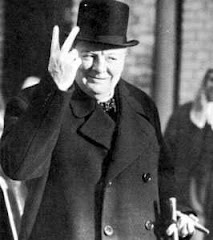
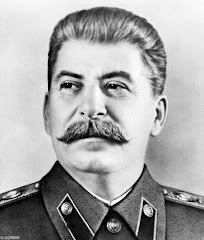
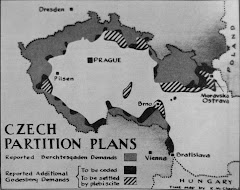
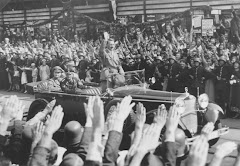

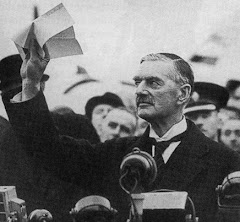
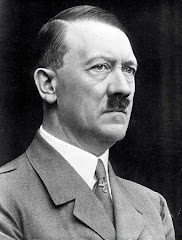




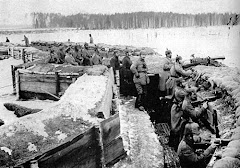


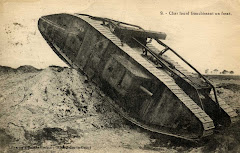



14 comments:
Neville Chamberlains view in this diary section was he was trying to share with us what the problems were going to be if we tried to help Czechoslovakia. I agree with Neville Chamberlain’s position that he was not able to help Czechoslovakia because of the distance and she was just an excuse to go to war.
Hitler’s aims during the Second World War that can be gained from his speech were that he wanted to attack Poland. Hitler really wants to scare the people in Western Europe for the war that he will be starting.
In Roosevelt's speech, he states he wants to pursue a policy that can satisfy all countries, avoiding another war. He wants the political situations in the world to end, and he wants stability between nations. Roosevelt and Americans hope for peace, America hates war.
The Germans despised the West and East. Germans wanted to expand their country and secure their community. There are some similarities between the Kaiser and Hitler, they both made the same military preparations, they both wanted Germany expanded and they both had a lot of hatred towards Great Britain and France. German foreign policies haven’t changed, the only difference is Hitler wanted more so to preserve their racial community.
In Roosevelt’s speech he emphasizes that all countries should work together to find an alternative to a world war. Roosevelt despised war and was strongly opposed to participating in another one. Roosevelt was seeking to obtain peace and avoid war by establishing laws and standards. Roosevelt wanted to create a peace policy that would neutralize the global tension, he states that “America actively engages in a search for peace”.
The attitude of Hitler and Mussolini are very much alike. They both are ready for war against England and France, they are both confident as Hitler says “the time will come when we shall have to fight side by side against England and France. All the better while the Duce and I are at the head of our countries, and still young and full of vigor.” The attitudes of Chamberlain and Daladier aren't as confident but they agreed.
Hitler's speech almost sounds scary. He wants to scare Europe, as he thinks it's the most humane way of conducting a war. He accomplished that in his speech, as he strongly states he wants to invade the poles and Russia. He is showing he truly wants to Germans to rule the earth, appearing so powerful, creating the fear.
In 1937 the Germans loathed the East and the West. In the case of a war the Germans strategized, they were determined to conquer the West to protect their land. In my opinion Hitler and Kaiser Wilhelm II shared similar strategies and ambitious desires. Both Hitler and the Kaiser wanted to expand Germany and strived to acquire imperial power. In my opinion the German foreign policy changed from 30 years prior. Hitler wanted to include all German speaking people under the third Reich, he also wanted to maintain and increase Germanys racial Volksmasse society.
Hitlers speech highlighted how insincere his intentions were. He spoke of invading Poland and seemed to have the German side of the second world war planned out. He mentions that he signed the Soviet-Nazi pact with the assumption that Stalin's illness will kill him soon and Germany can be a single world power. Hitler solely signed the pact because he knew it would hold off a war from the Russian front and he would be released from it once Stalin died.
Neville Chamberlain expresses his lack of confidence in stopping Germany from invading Czechoslovakia. He reasons that Germany is in the perfect position to enter the Czech land and France and Britain cannot do very much. Chamberlain is aware that protecting Czechoslovakia will spark a Second World War and he saw no desire to do that at that point in time.
I agree with Chamberlains position because he although Czechoslovakia needed their help, the world was still recovering from the recent war and Britain, as well as France, wanted to avoid starting a second war at the time.
Neville Chamberlain had a strong, opposing view to the idea of Britain and France protecting Czechoslovakia from the Germans invading. Chamberlain thought it was inadequate to support the Czechs since Germany was in such a good position to invade their land. Neville Chamberlain was aware that defending Czechoslovakia would create tension within Europe which could result in another world war. Neville Chamberlain didn’t want to risk losing a vast number of men to aid a country so far from Great Britain, he instead strived to obtain peace.
In 1938 I would’ve agreed with Neville Chamberlain’s reasoning. Many countries were still recuperating from world war 1 economically, politically and emotionally. Although Czechoslovakia was in desperate need of aid, Britain and France were at risk of commencing another world war. Britain and France hoped to avoid another war at all costs since Europe was still recovering from the damage of the recent war.
Roosevelt's view in his speech made to the people of Chicago in 1937 was that he wanted American stability and no involvement in war. He wanted all countries to be pleased, co-operate and come together instead of war and aggression. Roosevelt is a pacifist and would like to see America progress and strive towards perfection economically. He believes that all countries should work together and sort their differences out with alternatives other than war. He wanted to create a peace policy to encourage peace between nations and furthermore discourage war.
Post a Comment